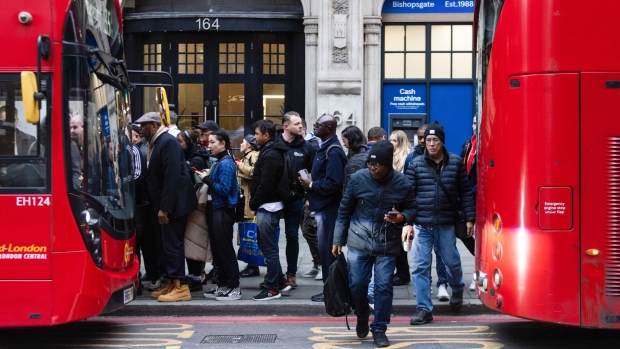Nov 11, 2022
Trains, Planes and Buses: What’s Next on UK’s Strike Agenda?
, Bloomberg News

(Bloomberg) -- Christmas in the UK is set to be blighted by a wave of strikes across the rail network and many other parts of the public sector, including the postal service and hospitals.
Workers are battling for pay hikes that keep pace with inflation, and in some cases oppose post-Covid changes to the transport system.
The prospect of widespread chaos at such an important time of year has given the government a headache. Ministers are pushing for a deal between train companies and unions but are also trying to keep a tight rein on Britain’s stretched public finances.
Here’s the current state of play.
When are the next rail strikes?
Strikes are planned on Dec. 13, 14, 16 and 17 by the National Union of Rail, Maritime and Transport Workers, with the labor group saying 40,000 of its members will walk out at 14 train companies as well as Network Rail. The Transport Salaried Staffs’ Association has also announced strikes on Avanti West Coast on Dec. 13, 14 and 16, and a range of lines including Avanti on Dec. 17.
Engineers on Great Western Railway, represented by the Unite labor group, have scheduled a strike for Dec. 15.
The RMT has also announced strikes affecting Network Rail on Dec. 24-27 while recommending its members reject a pay offer from the organization.
However, the union has scrapped an overtime ban that risked mass cancellations between Dec. 18 and Jan. 2.
The RMT has scheduled train strikes into next year, on Jan. 3, 4, 6 and 7.
Eurostar International Ltd. security staff will strike on Dec. 16, 18, 22 and 23, threatening to disrupt thousands of journeys between the UK and continental Europe.
Bus drivers are planning to walk out, too?
Yes. London bus drivers at Abellio Transport Group Ltd. are striking on Dec. 9, 10, 16 and 17, affecting services across large parts of the UK capital.
Workers on Metroline Ltd. threatened to strike but have now reached an agreement on pay.
Will I be affected if I’m flying away for Christmas?
The aviation sector is not being hit by industrial action anywhere near as much as the railways. However, strikes from baggage handlers at Heathrow on the eve of the school term ending could affect flights.
What’s at issue in these disputes?
Largely they’re about pay. Like Liverpool dockworkers, who earlier in November secured a basic wage increase of 9%, transport workers want raises close to the UK’s inflation rate, which has climbed above 11%.
Rail workers are resisting changes to the network after the Covid-19 pandemic changed passenger habits. Royal Mail staff are also opposed to reforms that the company says are crucial in order to remain competitive in the deliveries market.
Hasn’t there been some progress?
Train companies have offered 4% raises for this year, and the same next year, but unions are holding out for more.
Network Rail’s offer, which goes further, has been put to a vote. However, while the TSSA has recommended the deal to its members, the RMT has suggested that its workers reject it.
Ministers have been meeting union bosses such as Mick Lynch in an attempt to pave the way for more fruitful talks with train companies.
©2022 Bloomberg L.P.


